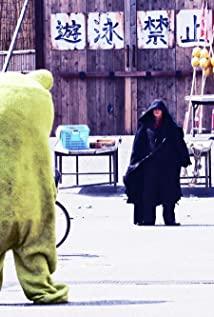If watching this movie is unfortunately spoiled, it will feel like Kase, who is flying out of fans, will not hurt after being shot. Convenience is convenience, but is that numbness really good?
The following strong spoilers
========
The French version adds the subtitle "The Last Yakuza", which is actually quite good, otherwise the title "First Love" carries a wonderful dislocation that will add another layer. Leo is not Monica's first love, and the most romantic aspect of the film is probably not the relationship between the two protagonists. When Gondo, the descendant of the katana (dao?) let go of the steering wheel and headed into the morning sun, behind him countless police cars and sirens flashed with lights, like an illusory and majestic grand funeral. Who can say that this is not another one who is no longer young Is the director singing a sentimental elegy for his life?
Just as Quentin’s “justice” must be resurrected on the defiant, arrogant and vulgar suspected wife murderer, so the glimmer of “benevolence and justice” cherished by Mr. Sanchi must also be flashed by seemingly impossible characters—it’s not that I want to. Than, "Talentino-style romantic comedy," that's what the trailer says. The Chinese gang, who was accused of "breaking the rules" at the beginning, sent a woman who didn't even make her name clear (the subtitles are written in Roman sound Chia, the full name sounds more like Jiaqi). It seems that some people are helping Western audiences to worry about it, fearing that cultural differences will cause a gap in understanding. The intellectuals of Le Monde who worked behind closed doors commented on the Oriental cult and threw out a series of big words like "the crisis of existence" and "Nietzsche's smile". Although they seemed to be pretentious and generous, but a gangster woman is not a Taoist. , How complicated and abstract is the kindness and justice she understands? It's nothing more than indulging in the image of the upright gangster in the movie, plus the adherence to the principle of not killing innocent people in my heart.
She couldn't figure out why Leo appeared at the scene of the melee, and in a hurry, she asked him aloud "underworld or civilian", and he answered "civilian". If she is a stranger, she might not be able to let him go so easily. After all, in this age of declining people’s minds, the police are incompetent and degenerate, and the gangs are infiltrated by outsiders. Unscrupulously engage in rebellion. The Japanese gang is like this, and the Chinese gang is not much better. Lies and betrayals are everywhere.
But she believed him. At that time, she was a Japanese actor who was most familiar with Chinese women as an idiot in the restaurant where he worked. He peeled the preserved egg without saying a word. She knew he was telling the truth, so she decided to let him go. But this kid is horizontal, and he wants to take away the gang's target Monica. When he came back after a round of killing, he not only didn't leave, but he also raised his gun at her, swearing to the death to defend the girl behind him. She asked him again "underworld or civilian", and he answered "civilian".
A civilian was so nervous in front of her that he couldn't breathe well, and he dared to criticize the underworld by himself when he touched a gun for the first time. Before her eyes appeared Takakura Ken of the peak age, brave, upright, and stalwart. She told him to go quickly again-this time with his girl... It is such a woman who idolizes Takakura Ken on the screen. Just imagine how she can endure the fraud and filth represented by the power of holding a murder license in reality? So when the badass policeman argued for her collusion with the gang, she couldn't bear to break his head, even if the next second was blood splattered on the spot. Ms. Miike is very fair, an elegy for both the Japanese underworld and the Chinese underworld; both for men and women.
I have to say that Mr. Miike, who knows the essence of romance, is very considerate of women. Not superior sympathy, but sympathy with love. If it weren't for the embarrassing acting skills of the Monica actor, we should feel this more easily. Thomas felt that Teresa was a child who drifted down the river in a straw basket. How could he let it drift down the river toward the violent and turbulent waves? Kundera said that love comes from a metaphor. If there is no story of rescuing the outcast, people cannot write a legend. Leo left Monica, who was temporarily out of danger, on the streets of Shinjuku, a mixed bag, and couldn't help but look back frequently. Her figure curled up behind the barbed wire, like a small animal trapped in a cage. She was an orphan sold by a wretched father, no different from him who was abandoned by her parents when she was born. Monica, who is suffering from drug addiction, regards Leo as her first love, a boy who once punched her bastard dad for her. At this time, she is the weak and the object to be saved by him. What happened at this time was not love.
In Japanese literature and art that I have rarely involved in, daddy issue is a topic that appears too frequently, which is probably a faithful reflection of the East Asian patriarchal society. But when Monica listened to the song Leo gave, her father's vision was no longer gloomy and terrible, but changed and danced, becoming a funny harlequin. With his company, the fear imposed by his father gradually disintegrated. The little girl cowering in her father's shadow came off her, and she left her in her childhood room. At the last moment, she no longer trembles with fear, but kicked the key of her father in the hallucination. The redemption back then came from the fist thrown by the first love, but now it is done by myself. The cold water bath washes away the blood (for such a romantic movie, it would be too horrible to ask for realism), and also wash away everything in the past. The curse of first love is eliminated, just as the curse of father flew into Tokyo with white powder The night. She can finally face true love innocently.
Therefore, even though the rhythm of this "First Love" is lacking, the narrative is full. Didn't Mrs. Kawabata once said that even though Japanese culture is sentimental, it doesn't have the utter emptiness of Western despair? (Philosophers of Le Monde, please!) Even death is not desperate. A big smile can be seen from the head alone. If you are lucky enough to survive a catastrophe, you have to live a long time, especially for orphans and prostitutes. That's why, in a world where Scorsese didn't have the money to shoot gangsters, even though Ms. Miike sang an elegy, his neurotic tone was like Leo's music library, he was still happy, applauded and laughed.
View more about First Love reviews











